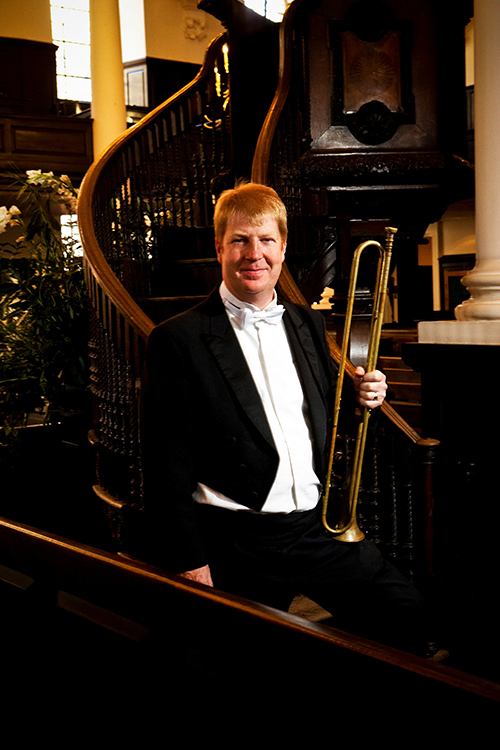In our upcoming holiday concert, Sound the Trumpet!, David Blackadder makes his Tafelmusik debut, performing music by Fasch, J.S. Bach and more.
B
The trumpet is often thought of as being perhaps the most majestic, powerful instrument of all, and traditionally this is often the case especially when large groups of trumpeters played together. The sound of multiple trumpets became so synonymous with the European nobility that it actually became a status symbol in courts across Europe to have an elite group of trumpeters, not unlike having a fleet of limousines or Ferraris today. This tradition still continues in some countries, and you need to look no further than the moment when Megan Markle arrived at Windsor Chapel to hear the spine-tingling sound that the trumpeters of the Household Cavalry made to understand why.
However, there is a much more subtle, lesser-known side to the trumpet which uses the more florid, angelic quality of its upper register to symbolize the glory of God and the heavens. Handel’s “Eternal Source of Light Divine” followed the trumpet fanfare at the royal wedding as Megan processed down the aisle, and showed off just how lyrical the trumpet can be, particularly when imitating the human voice.
The trumpet that I used that day and for Sound the Trumpet! with Tafelmusik is a copy of an instrument originally made in Nuremberg by Johann Carl Kodisch around 1700. It was made by Mathew Martin of Norwich Natural Trumpets and has extremely light tubing, which makes it easier to play sustained passages in the high register. This technique of playing developed throughout the seventeenth and eighteenth centuries, and became highly prized by composers and their patrons alike. The sound that can be achieved in the high register is not unlike that of a woodwind instrument, and the trumpet was indeed said to be capable of being “as sweet as an oboe.” By using different articulations the best trumpeters could play very delicately and their trills were said to rival that of any flautist of the day. Court trumpeters were handsomely rewarded for their prodigious skill and were required to play at the most important ceremonies and state occasions.
In my new partnership with Tafelmusik I would like to bring to light this gentler side of the baroque trumpet and show how it can shine perfectly well without the need to blast loudly at any point. The Fasch Concerto is a wonderful example of this, particularly the beautiful slow movement, and in the Brandenburg Concerto the trumpet shows off its incredible ability to balance with the other soloists in the absolute extremities of its high register. I remember playing to my late father the first recording of the Brandenburg Concerto I ever made as a student at the Royal College of Music. He said, “Sounds more like a flute than a trumpet to me, son.“ He didn’t realize just what a compliment that was, but I knew what he meant and I have always strived to achieve that same quality throughout my career.
Join David Blackadder in Sound the Trumpet! from November 21–25, 2018 at Jeanne Lamon Hall, Trinity-St. Paul’s Centre. Tickets are available here.
Photo by Boyd Gilmour
